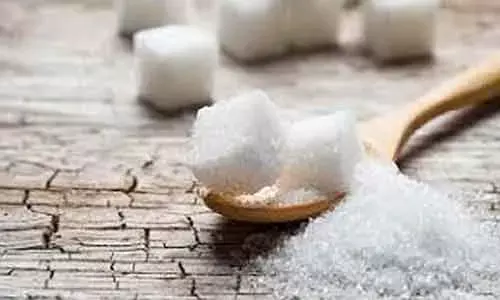- Home
- Medical news & Guidelines
- Anesthesiology
- Cardiology and CTVS
- Critical Care
- Dentistry
- Dermatology
- Diabetes and Endocrinology
- ENT
- Gastroenterology
- Medicine
- Nephrology
- Neurology
- Obstretics-Gynaecology
- Oncology
- Ophthalmology
- Orthopaedics
- Pediatrics-Neonatology
- Psychiatry
- Pulmonology
- Radiology
- Surgery
- Urology
- Laboratory Medicine
- Diet
- Nursing
- Paramedical
- Physiotherapy
- Health news
- Fact Check
- Bone Health Fact Check
- Brain Health Fact Check
- Cancer Related Fact Check
- Child Care Fact Check
- Dental and oral health fact check
- Diabetes and metabolic health fact check
- Diet and Nutrition Fact Check
- Eye and ENT Care Fact Check
- Fitness fact check
- Gut health fact check
- Heart health fact check
- Kidney health fact check
- Medical education fact check
- Men's health fact check
- Respiratory fact check
- Skin and hair care fact check
- Vaccine and Immunization fact check
- Women's health fact check
- AYUSH
- State News
- Andaman and Nicobar Islands
- Andhra Pradesh
- Arunachal Pradesh
- Assam
- Bihar
- Chandigarh
- Chattisgarh
- Dadra and Nagar Haveli
- Daman and Diu
- Delhi
- Goa
- Gujarat
- Haryana
- Himachal Pradesh
- Jammu & Kashmir
- Jharkhand
- Karnataka
- Kerala
- Ladakh
- Lakshadweep
- Madhya Pradesh
- Maharashtra
- Manipur
- Meghalaya
- Mizoram
- Nagaland
- Odisha
- Puducherry
- Punjab
- Rajasthan
- Sikkim
- Tamil Nadu
- Telangana
- Tripura
- Uttar Pradesh
- Uttrakhand
- West Bengal
- Medical Education
- Industry
Diet drinks may increase craving for food, thwart weight loss effort in obese: JAMA

Consumption of diet drinks may thwart weight loss initiative and those containing the artificial sweetener sucralose may even increase food cravings and appetite in women and people who are obese, according to University of Southern California researchers.
The findings of this study was published in Journal of American Medical Association on 28th September, 2021.
Obesity is one of the major concerns in recent times. In a study it was seen that females and those with obesity, particularly females with obesity, may be more susceptible to the increased neuronal responsiveness evoked by sucralose ingestion as compared to sucrose consumption. Nonnutritive sweeteners (NNSs) are used in place of nutritive sweeteners to satisfy sweet cravings while lowering calorie consumption.
However, research on the effects of NNSs on appetite have yielded conflicting findings, and the connections between sex and obesity with reward and appetitive responses to NNS vs nutritive sugar remain unclear.
The following study was conducted by Alexandra G. Yunker and team, with an objective to compare the brain responsiveness of healthy young adults to different types of high-calorie food cues (sweet and savoury), metabolic responses, and eating behaviour after consuming sucralose (NNS) vs sucrose (nutritive sugar).
Participants in a randomized, within-participant, crossover study with three independent visits completed a functional magnetic resonance imaging task that measured blood oxygen level–dependent signal in response to visual stimuli. Plasma glucose, insulin, glucagon-like peptide, acyl-ghrelin, total peptide YY, and leptin were measured in blood samples taken at baseline, 10, 35, and 120 minutes after participants drank a drink containing sucrose, sucralose, or water. From March 2020 to March 2021, data was analyzed. Participants drank 300-mL beverages containing sugar (75 g), sucralose (individually sweetened), or water (as a control).
Researchers discovered BMI status by drink interactions for BOLD signal response to viewing savoury food vs nonfood cues in the MFC and OFC, and post hoc stratified analyses revealed that individuals with obesity, but not those with overweight or healthy weight, exhibited greater BOLD percentage signal change to savoury vs nonfood cues after sucralose compared to sucrose. There were also robust sex by drink interactions for BOLD signal response to several food cue contrasts in the MFC, hippocampus, OFC, insula, and dorsal striatum, such that female participants but not male participants exhibited greater BOLD signal, particularly in the MFC and OFC, to several food cue contrasts after consuming sucralose versus sucrose. The data suggest that young female participants had a higher sensitivity to nutrition sensing, which we believe developed as a reproductive protection strategy.
In conclusion, this study emphasizes the need of taking individual biological variables into account in research investigations and possibly in dietary advice about the usage and efficacy of NNS for body weight management.
Reference: Yunker AG, Alves JM, Luo S, et al. Obesity and Sex-Related Associations With Differential Effects of Sucralose vs Sucrose on Appetite and Reward Processing: A Randomized Crossover Trial. JAMA Netw Open. 2021;4(9):e2126313. doi:10.1001/jamanetworkopen.2021.26313
Medical Dialogues consists of a team of passionate medical/scientific writers, led by doctors and healthcare researchers. Our team efforts to bring you updated and timely news about the important happenings of the medical and healthcare sector. Our editorial team can be reached at editorial@medicaldialogues.in.
Dr Kamal Kant Kohli-MBBS, DTCD- a chest specialist with more than 30 years of practice and a flair for writing clinical articles, Dr Kamal Kant Kohli joined Medical Dialogues as a Chief Editor of Medical News. Besides writing articles, as an editor, he proofreads and verifies all the medical content published on Medical Dialogues including those coming from journals, studies,medical conferences,guidelines etc. Email: drkohli@medicaldialogues.in. Contact no. 011-43720751


